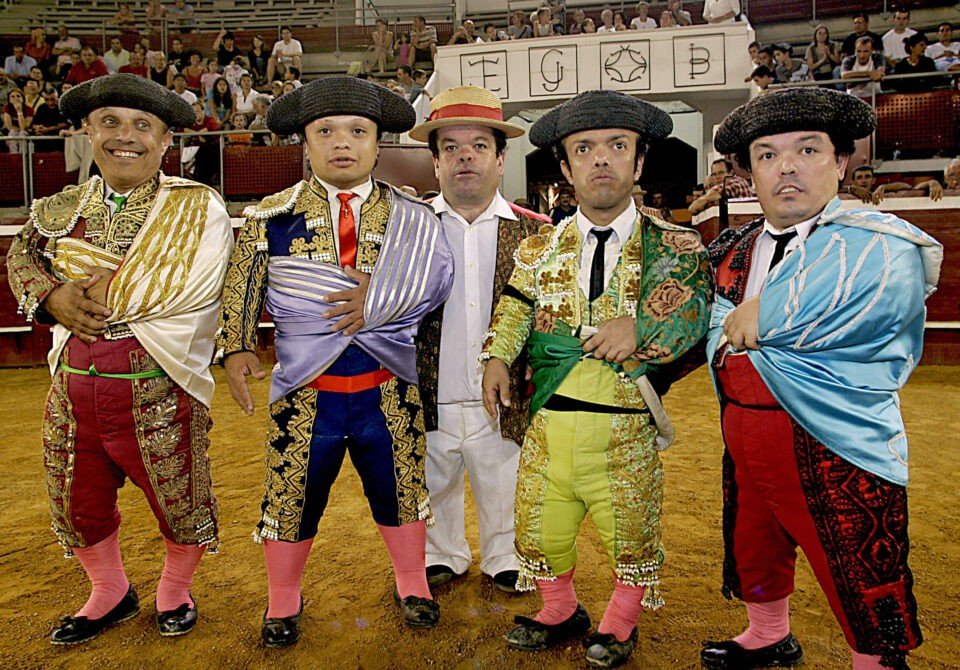ORGANISERS of Spain’s famed dwarf bullfighting shows claim matadors are “idols for children” as calls mount for the sport to be abolished.
For hundreds of years, towns and villages across the country have hosted bullfighting events, and in some shows people with dwarfism fight small or young bulls – which activists say is “degrading” for those with disabilities.


Campaigners had hoped that Covid pandemic would be the death knell for the sport as bullfighting was postponed as soon as the Spanish government declared its national emergency last March.
But by August 2020, shows had returned and now Spain’s Social Rights Ministry wants the sport to be banned after reportedly being told the practice “had to be abolished” at the most recent UN compliance review in Geneva.
The issue was thrown back into the spotlight last Friday when the ministry called for the cancellation of a show featuring bullfighters with dwarfism, organised by comedy troupe Diversiones en el Ruedo (Amusement in the Ring), reports El Pais.
Despite backlash, it went ahead.
Martín Blanco, who suffers from bone dysplasia, a type of dwarfism, has slammed the shows – especially as they are aimed at youngsters.
“If the children are going to laugh at a person in a bullring, they will surely laugh at me when they come out,” he told the outlet.
His concerns have been echoed by Carmen Alonso, whose son has dwarfism.
“I have been trying to get these types of shows banned since my son was born, and he is now 29,” she said.
“People need to understand that people with disabilities are going to be mocked, in many cases over 60 per cent or 70 per cent of the time.
“Walking down the street we have been pointed at many times, and people say things like ‘there goes the bullfighter fireman’.”
Bullfighting remains legal throughout much of Spain – but some areas have outlawed the sport, including Calonge, Tossa de Mar and Vilamacolum.
The sport was banned in Catalonia back in 2010, which came into effect in 2012.
But after sparking controversy, the ban was annulled for being unconstitutional by Spain’s highest court in 2016.
And despite growing fallout from dwarf bullfighting events being staged, many continue to throw their support behind gatehrings.
Daniel Calderón, the manager of Diversiones en el Ruedo, who is also a bullfighter, has defended the tradition.
“I think these attacks show a lack of respect and freedom,” he told El Pais.
“Everyone should be able to work at what they want.
‘IDOLS FOR CHILDREN’
“We are all professionals; we are accredited with the Culture Ministry; we contribute to the Social Security system, and we do not want to live on subsidies, we want to fight. It’s our trade.
“I invite everyone to come and see if they are really laughing at them or laughing with them. It’s a show like any other.
“Contrary to what’s being said, they are idols for the children.
“The kids go down to the bullring; they do some bullfighting; they have a good time with them, and being of the same stature, they feel like the real thing.”
Although still legal in many parts of Spain, data shows bullfighting show numbers have dwindled in recent years.
In 2019, there were 349 bullfights – only 11 of which were from comedy troupes and likely involved dwarfs coming face to face with animals, according to figures from the Culture Ministry’s Statistics of Bullfighting Affairs.
Last year, only a handful of events were staged.
During one such show, believed to have taken place at a bullfight in Spain, a raging bull knocked down a female dwarf bullfighter before mounting her.
The 100-stone beast could be seen humping the fallen fighter after knocking her off her feet in shocking footage shot from the sidelines.
Screams rang out from the horrified crowd as they watch her being brutally attacked before rushing to her aid.
One could be seen dragging away the animal while another helped the bullfighter back to her feet.





